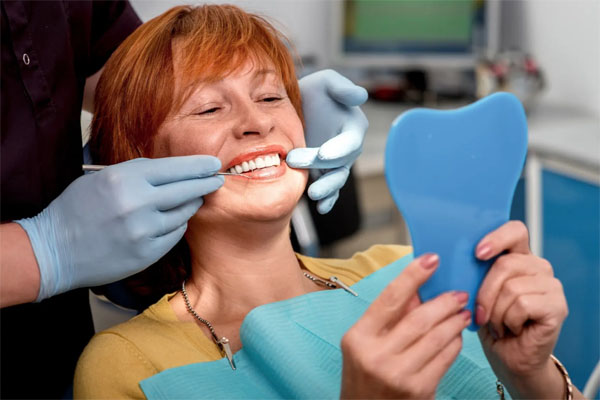Dental Implants vs. Dentures: What’s the Better Choice?
By Space Coast Daily // May 12, 2025

Missing teeth don’t just affect your smile. They can impact your ability to chew, speak clearly, and even influence your self-confidence. If you’re facing the decision of how to replace lost teeth, you’ve likely come across two primary options: dental implants and dentures. Both solutions aim to restore function and aesthetics, but they differ significantly in approach, cost, and long-term benefits.
Understanding these differences is crucial for making an informed choice that aligns with your lifestyle, budget, and oral health needs. This article will discuss everything you need to know about the two to help you make the best choice for your situation.
Understanding Dental Implants and Dentures
Tooth replacement has come a long way in recent years. Today’s options look and feel much more natural than what your grandparents might have had.
Dental implants are titanium posts surgically placed into your jawbone that work like artificial tooth roots. They’re topped with crowns that look just like natural teeth. Because dental implant surgery involves anchoring the implants in your jaw, it prevents bone loss and feels incredibly stable.
Dentures, on the other hand, are removable replacements that sit on your gums. They can replace just a few teeth (partials) or all your teeth (full dentures). They don’t require a surgical procedure and typically cost less upfront than implants.
Benefits of Dental Implants
Dental implants have some major advantages that make them worth considering. You won’t need to take them out for cleaning. Instead, you just brush and floss them like real teeth. No special cleaners or adhesives required.
You can also eat pretty much anything with dental implants. They restore nearly all your natural chewing power, so crunchy apples, corn on the cob, and steaks are all still on the menu. They help maintain your face shape as well. When teeth are missing, your jawbone starts to shrink over time. Dental implants stimulate the bone like natural tooth roots, preventing that sunken look that can make you appear older.
Plus, you’ll never worry about your teeth slipping while talking. This confidence boost is huge for many people who’ve struggled with loose dentures.

Limitations and Considerations for Implants
Dental implants aren’t perfect for everyone. To get them, you need to have enough healthy jawbone to support the structure. If you’ve been missing teeth for a long time, you might need to undergo bone grafts first, which can add both time and expense to the process. It’s definitely a journey that requires some patience!
Implants aren’t cheap, either. A single implant can cost several thousand dollars, and if you’re considering replacing all your teeth, it’s a significant financial commitment. Most insurance plans only cover a fraction of the costs, if they cover anything at all. Additionally, certain health issues can complicate matters. If you have uncontrolled diabetes, smoke, or are on specific medications, getting successful implants might be riskier or less likely to succeed.
Benefits of Choosing Dentures
Dentures have been a reliable option for a long time, and for good reason. Almost anyone can get them, no matter their bone density or any health issues that might make surgery a no-go. Plus, the cost is a big factor. Complete dentures usually come at a fraction of the price of full-mouth implants, making tooth replacement doable even for those on a tight budget.
These days, dentures look way better than the old-school versions. They’re tailored to fit your mouth perfectly and mimic the look of natural teeth. Many people find themselves receiving compliments on their smiles after getting modern dentures. And the best part? You’ll have your new teeth much quicker. While implants can take months of healing between steps, you can often get dentures just weeks after extractions. That means less treatment time without teeth!
Challenges With Denture Use
Dentures do come with drawbacks. Getting used to them takes time. Many people struggle with speaking clearly and eating comfortably during the first few weeks or months. Stability is an ongoing issue. Even with good adhesives, dentures can shift when you eat or talk, causing embarrassment and sore spots on your gums.
They also require more daily maintenance than natural teeth or implants. You’ll need to remove and clean them daily, soak them overnight, and handle them carefully to avoid breaks.
Your eating ability takes a hit, too. Dentures typically give you less than half your natural chewing power. So, you might need to avoid tough steaks, chewy bagels, and sticky foods you once enjoyed.
Without tooth roots stimulating your jawbone, it gradually shrinks over time. This changes your face shape and makes dentures fit poorly after a few years, requiring adjustments or replacements.
Hybrid Solutions Worth Considering
If neither option feels quite right for you, there’s a happy medium to explore. Implant-supported dentures utilize a few implants to securely hold a full denture in place. This setup offers better stability compared to traditional dentures, all while being more budget-friendly than going for full implants.
If you’re only missing a few teeth, partial dentures can be a great choice. They attach to your remaining natural teeth for added support.
Making Your Decision
When it comes to making your decision, it really boils down to your individual circumstances, as well as your dentist’s recommendation. Consider factors like your age, health, budget, and lifestyle. For younger patients, the long-lasting nature of implants can be a big advantage. If you lead an active life or often find yourself speaking in public, the stability that implants offer might just be worth the extra cost.
In some cases, starting with dentures and later transitioning to implants can be the best route to take.
Key Takeaway
Choosing between dental implants and dentures is a personal decision that affects your daily comfort and confidence. So, talk with your dentist about which option fits your specific needs, health conditions, and budget. With the right choice, you’ll be back to smiling, eating, and speaking with confidence before you know it.












